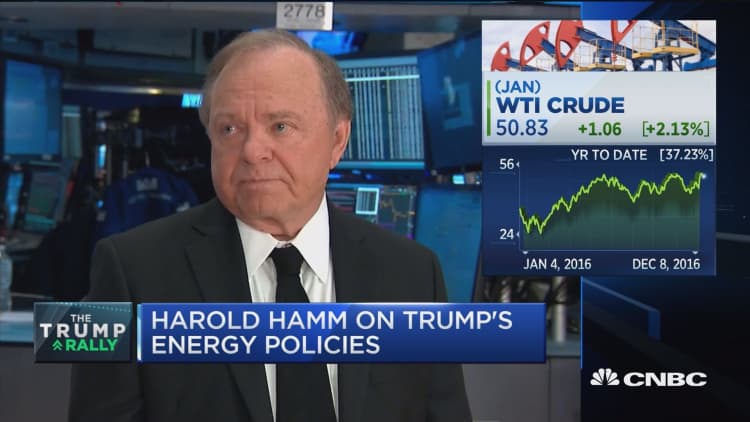
Donald Trump's pick for Environmental Protection Agency chief has harshly criticized the agency and questioned humans' role in global warming.
Oklahoma Attorney General Scott Pruitt, who along with other state attorneys general is suing the EPA over Obama administration rules, has repeatedly slammed the agency for what he argues is regulatory overreach. The pick gives a clear signal that Trump could follow through on pledges to roll back climate-related regulations and improve the operating environment for fossil-fuel companies.
Here are some of his recent statements on the EPA and climate change, which show how much his EPA would likely diverge from the agency's current policy.
1) Pruitt testified before Congress on what he viewed as the EPA's role in 2013. Here is what he said then, according to a statement from his office.
"There is a great deal of frustration among the states with the EPA's attitude that ignores the proper role of the states as the agency attempts to expand its authority. The EPA seems to have a view that the states are merely a vessel to implement whatever policies and regulations the Administration sees fit, regardless of the wisdom, cost or efficiency of such measures. Fortunately for the states, that is not what the law allows. Congress clearly intended for the states to have primacy in the areas of environmental regulation and for the EPA to work with the states closely to regulate those issues. However, the EPA is attempting to usurp the role of the states all in the name of imposing the Administration's anti-fossil fuel mentality."
2) In May, Pruitt and Alabama Attorney General Luther Strange penned an op-ed ripping some attorneys general for seeking possible investigations into oil and gas companies that argue against the science showing man-made global warming. He accused them, "green-energy interests and environmental lobbying groups" of trying to "silence critics" of a "climate-change agenda."
Pruitt and Strange wrote:
"We won't be joining this coalition, and we hope that those attorneys general who have joined will disavow it. Healthy debate is the lifeblood of American democracy, and global warming has inspired one of the major policy debates of our time. That debate is far from settled. Scientists continue to disagree about the degree and extent of global warming and its connection to the actions of mankind. That debate should be encouraged — in classrooms, public forums, and the halls of Congress. It should not be silenced with threats of prosecution. Dissent is not a crime."
The vast majority of scientific experts agree that humans cause climate change, though many government officials dispute that notion.
3) A month later, Pruitt signed off on a letter from a group of attorneys general calling the formation of the so-called "AGs United for Clean Power" a "grave mistake." The group said it wanted to look into "whether fossil fuel companies misled investors and the public on the impact of climate change on their businesses.
The letter, signed by 13 attorneys general, said this about climate change and the potential drawbacks of combating it:
"We all understand the need for a healthy environment, but we represent a wide range of viewpoints regarding the extent to which man contributes to climate change and the costs and benefits of any proposed fix."
4) In announcing a lawsuit against the EPA over the Waters of the United States rule last year, Pruitt's statement accused the agency of having an "often byzantine regulatory regime." The rule, which defined which waters fall under EPA and Army Corp of Engineers jurisdiction, faced staunch opposition from industries like agriculture and oil.
"Respect for private property rights have allowed our nation to thrive, but with the recently finalized rule, farmers, ranchers, developers, industry, and individual property owners will now be subject to the unpredictable, unsound, and often byzantine regulatory regime of the EPA. I, and many other local, state and national leaders across the country, made clear to the EPA our concerns and opposition to redefining the 'Waters of the U.S.' However, the EPA's brazen effort to stifle private property rights has left Oklahoma with few options to deter the harm that its rule will do."
5) Also last year, Pruitt in a statement celebrated the Supreme Court's ruling in Michigan v. EPA, in which the top court ruled in a 5-4 decision that the EPA unreasonably applied a provision to regulate power plants when "appropriate and necessary."
"The U.S. Supreme Court's opinion in Michigan v. EPA is a substantial victory for Oklahoma industry and consumers. Thanks to our victory, the EPA can no longer ignore the substantial costs its rulemaking can heap on industry, and eventually ratepayers. The EPA routinely ignores statutes and congressional directive in order to pick winners and losers in the energy arena. This ruling will support Oklahoma's continued challenges of the EPA's attempts to act outside the authority granted to it by Congress and the law."


